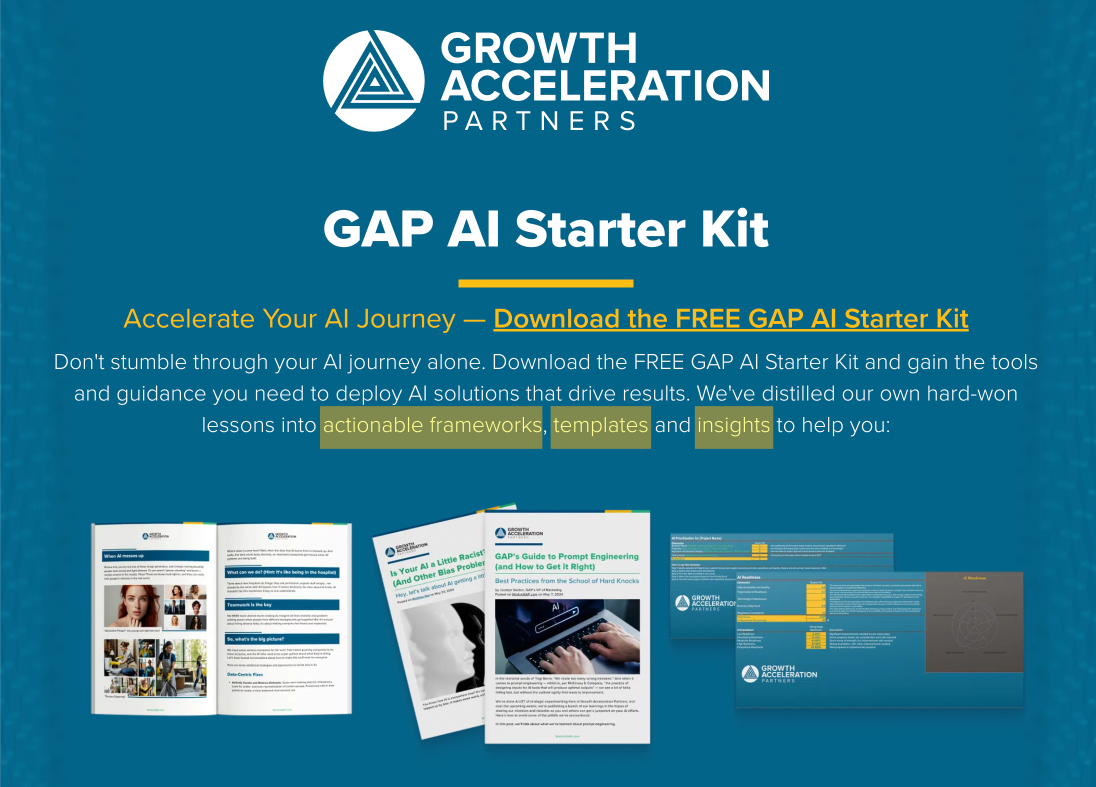Developers are no longer strangers to using artificial intelligence (AI) tools, but integrating them into their tech stack may present new challenges. First, there are thousands of AI tools for software development, and this variety can be overwhelming. Second, developers are tasked with finding the best AI tools that enhance efficiency and adapt to their team needs, project workflows, and industry-specific needs.
Therefore, as we move into 2025, choosing the best AI platforms for software development in 2025 requires a more strategic approach.
In this article, we’ll consider the best AI tools for software developers, choosing methodology, their features, and expected features. By the end, you’ll be equipped with the knowledge to make smarter decisions when integrating AI into your next development project.
What Developers Need to Consider When Choosing AI Tools – The GAP Approach
Therefore, our developers drew from their daily experiences to present key factors you must consider when selecting AI tools for your projects:
- Security: Privacy and security are major concerns because you don’t want to expose your data to vulnerabilities that may affect your business. You want to ensure the tool won’t expose your data to third-party or data breaches. So, choose the ones that offer full control over your data accessibility.
- Collaborative Features: Developers don’t work in silos, making collaboration an important attribute to consider in an AI tool. Ask these questions and ensure you have a solid YES before settling for the tool:
- Will the platform allow you to collaborate as a team?
- Can you export the results easily to other tools?
- Will it support importing codes, images, and files and operating over them?
- Compliance Compatibility: While this applies to development projects generally, some projects need specific compliance checks. For instance, finance and healthcare projects prioritize industry-specific regulations. Ensure the tool is versatile and supportive in compliance checks, regardless of the industry.
- Integration/Vendor Lock-in: You should be able to stop using the tool whenever you wish without getting locked into a specific vendor’s ecosystem. Ask the following questions:
- Does the tool integrate seamlessly with other development tools/environments, browsers, IDEs, and more?
- Does using the tool represent a commitment to continue using the vendor’s products or environment?
- Does it support API integration that will enhance communication with other software?
- Model Hosting Approach: Understanding how and where the tool hosts underlying foundational language models for security and regulatory purposes is important. This could be concerning for projects dealing with sensitive data that needs to be part of the input for the code to function properly. Ask these questions:
- Is there code on external servers that may be subject to processes of inspection or intervention by the provider that users may not be privy to?
- Does the service allow using locally hosted models to handle the prompts and other input?
5 Critical AI Tools for Developers in 2025 and Their Emerging Features
As of today, there are thousands of AI tools with unique features that can support different aspects of software development. However, based on our experimentation at GAP, we have considered these five AI tools below as powerful assistants to developers.
- GAP AI-Powered QA Accelerators
- Tabnine
- GitHub Copilot
- Amazon CodeWhisperer
- Gemini
-
GAP AI-Powered QA Accelerators

GAP AI-powered QA Accelerators is an AI tool designed to empower your team with error-free software testing and code reviewing. This automated testing tool is connected through an API with ChatGPT to analyze codes and suggest relevant improvements based on your project’s user story.QA teams, testers, development teams, engineers, and other tech staff saddled with the responsibility of software testing will find it useful for saving time and improving their process. GAP AI-Powered QA Accelerators key features include:
- Test case generation using the user story in JSON and CSV file formats
- Automated test scripts for code optimization and improvement suggestions
- Automated defect report generation
- Integrations with other software testing tools, APIs, and CI/CD
Emerging/upcoming features:
- Beyond Cypress and Pyrest, you can request other frameworks based on your process.
- Continuous training on AI-powered QA best practices as the tool evolves
GAP AI-powered QA Accelerators focuses
on improving
how tech teams approach code review and manage available resources (time and energy). It also helps these teams stay updated with AI-powered QA best practices, supporting continuous learning. -
Tabnine

Tabnine is another good software for AI development, automating code completion and prediction in their tech stack. It’s a lightweight AI code assistant that supports developers with project planning, code creation, documentation, reviewing, and testing using AI-powered chat mode. It supports over 80 programming languages and frameworks, including JavaScript, TypeScript, Python, Java, Ruby, Swift R, and more.We consider Tabnine suitable for privacy-conscious developers seeking a versatile code-writing assistant tool with security features, as it offers local model hosting options.
Tabnine key features include:
- Multiple IDE integration
- Code contextualization
- Protection from intelligent property liability
- Code privacy, offering you complete control over your codebase
- Zero-data retention, allowing you to choose where and how to deploy your code
- Comprehensive training base to guide developers on navigating and using the platform best
Emerging/upcoming features:
Based on the information in its documentation, Tabnine has continuously released monthly updates. And the last update focused on minimizing the legal risk of using GenAI for code writing. Its recent installation update also supports organizations in provisioning and deprovisioning users based on their identity status.
-
GitHub Copilot

Like Tabnine, GitHub Copilot is great at helping developers automate code writing. Although a comprehensive platform, it is flexible, offering developers many third-party apps, extensions, and more to support their development processes. For example, you can select from over 50 apps (such as Jira, Shopify, etc) and integrate with Copilot to streamline your workflow and increase productivity.
Its many integrated third-party tools allow developers to test and experiment without restrictions. You can choose which model to code with, from Phi-4, Open AI, Mistral Large, etc.
It’s important to note that GitHub Copilot only functions as a SaaS product and doesn’t allow hosting it on virtual private cloud servers. This may be a major concern for developers handling rigid compliance projects such as finance and health. Nevertheless, developers at every growth level will find it useful: beginners can leverage its prompt database to catch up with coding processes rather than spending hours building conversations from scratch.
GitHub Copilot key features include:
- Automated code suggestions
- Flexibility/adaptability in supporting developers’ needs in terms of multiple third-party integrations
- Multiple model selection for code quality comparison, options, such as Open AI o1, GPT 4o, Claude, etc
- Multiple file edits to fast-track bulk editing, leading to high productivity
- A comprehensive vulnerability database that facilitates speedy access to security features
Emerging/Upcoming Features:
GitHub has several upcoming features on its radar, scheduled to be launched for quarters 1 and 2, 2025. Many of these updates address responses to developers’ complaints and requests. The expected updates include:
- Reduction of execution time of the time Config feature to improve stability
- Enterprise administrators will be able to assign an organizational role to team members instead.
- Enterprise teams with security, auditing, and compliance requirements can now control who can close alerts, when and how alerts can be closed, and who can approve this activity.
-
Amazon CodeWhisperer

As the name implies, Amazon CodeWhisperer is another best AI-powered code-suggesting tool that functions within the AWS ecosystem. The tool stands to bridge the gap between developers and the vast resources of AWS.
It’s an intelligent asset recommending code completion based on the developer’s existing work process. However, its personalized recommendations may vary in quantity and scope, from a single-line comment to fully formed functions.
Amazon CodeWhisperer is a general-purpose coding companion optimized for popular AWS services like Amazon S3. This way, it generates high-quality suggestions incorporating AWS best practices, and developers won’t need to spend much time reviewing documentation.
Amazon CodeWhisperer Key Features include:
- Inline suggestions
- Integration with Amazon Web Services
- Code security scanning
- Reference tracking
- Integration with popular IDEs such as Visual Studio Code, IntelliJ IDEA, and others
Emerging/upcoming features:
Amazon CodeWhisperer is now merged with Amazon Q Developer. According to their documentation, migrating to Amazon Q will offer users access to functionalities such as diagnosing console errors, cost and resource analysis, and software for AI development.
-
Gemini

This powerful tool was developed by Google, functioning as an AI coding assistant to improve developers’ productivity. It integrates seamlessly with IDEs such as Visual Studio Code, IntelliJ, PyCharm, GoLand, WebStorm, Cloud Workstations, Cloud Shell Editor and other JetBrains IDEs. It supports over 20 programming languages and supports over 30 natural prompting language chats.
You can use the Gemini coding assistant in the Firebase console to speed up your app development and launch quickly. With a series of chats with Gemini and follow-up questions, it’s possible for a junior developer with little app development technical expertise to develop a simple application.
We love its synchronization with other Google products, making it a good option for developers who frequently work within the Google ecosystem. This allows them to leverage the tool’s seamless integration with Google’s suite of tools and services.
Gemini key features include:
- AI code assistance
- Code customization
- 30+ natural language chat
- Code transformation
- Local codebase awareness
- App development in Firebase
- Data analysis with BigQuery
- Enterprise security
Emerging/upcoming features
- Google is working towards helping developers understand the source of their codes by introducing the IntelliJ Gemini Code Assist. This way, developers can use Gemini to confidently verify the code source to ensure it complies with licensing requirements and best practices.
- Developers can block all suggestions with citations to enhance security and facilitate industry compliance. This is good for internal regulation checks as organizations can ensure no external code or references enter the development environment.
Based on Gemini’s latest update, Google is tightening security and privacy control with Gemini for coding.
Projected Challenges Developers May Face and How to Stay Ahead
These AI-sparked developments are exciting, but their overall impact on developers may be overwhelming. In this section, we’ll explain 4 possible challenges developers may face and how they can manage them.
-
AI Tool Overload
The AI race is on and progressing rapidly. Given the projected AI growth, choosing from the vast array of AI tools will overwhelm developers. So, how will developers cope with this situation?
We urge developers only to choose tools that are most relevant to their needs and also consider the elements we mentioned above, such as:
- Security
- Compliance
- Model Hosting Approach
- Integration
- Collaboration
- Vendor Lock-in
Developers should also focus on established products like ChatGPT, Google Products, Amazon, etc. This is because these established products often offer all the features many new products claim to offer. Also, check out our AI Starter Kit to look through our lens of experience and see how we choose AI tools. You’ll get templates, insights, and frameworks to streamline this process and reduce the overload. You can download it here.

-
Data Privacy
Developers should continuously stay informed on the latest best practices to secure the development process. Although data privacy regulations like the GDPR still apply, specific AI regulations are expected to emerge. Nevertheless, we recommend that developers set clear, precise, and transparent data governance standards for software development projects.
-
Maintaining Human Creativity
While AI may become better at handling fundamental coding tasks and other complex ones, developers still need to review and refine the generated codes. Regardless of AI advancement, developers should leverage AI as an assistant, learning anchor, suggesting and assisting rather than allowing it to replace hands-on problem-solving.
-
4. Complexities with Integration
As AI tools demonstrate unique strengths in different processes, developers may want to integrate many AI tools, leading to a complex set-up. This may lead to compatibility issues and configuration complexities, thereby affecting performance. To avoid this, developers need to spend quality time in thorough planning and documentation to identify tools to integrate into their workflow and identify possible implications.
Stay Ahead of the Curve and Evolve With AI Today
AI tools are advancing to improve developers’ efficiency and productivity. However, with the speeding race of AI innovation, developers will likely be overwhelmed when choosing the best one for their development project. Therefore, the approach to AI integration should be refined through upskilling and sourcing for expert consultation.
Having an expert AI consultation can help your organization avoid bottlenecks associated with AI integration and bridge skill gaps. You will also be able to set realistic expectations and reduce the lifetime cost of AI programs.
At GAP, we specialize in enhancing business operations with our expert AI consulting service, especially now that most organizations have limited AI use. We help organizations unlock the full potential of data to obtain innovative solutions and actionable insights. Our core ML/AL service models include:
- Supervised learning model development
- Unsupervised learning and clustering.
- Unstructured data analysis and natural language processing (NLP)
- Large language models (LLMs) and generative AI
Ready to simplify AI adaptation for your business and drive innovations? Contact us today and schedule a free consultation.



